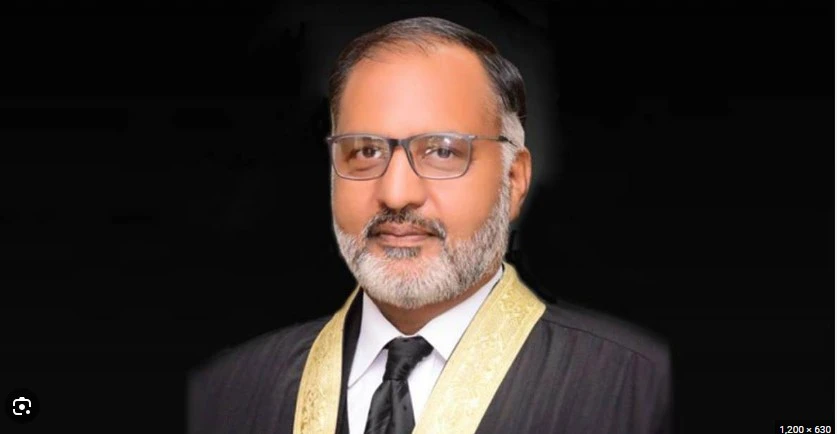Supreme Court overturns Justice Shaukat Siddiqui’s dismissal

Stay tuned with 24 News HD Android App

The Supreme Court (SC) on Friday declared the notification of dismissal from service of Islamabad High Court (IHC) judge Justice Shaukat Siddiqui null and void, reported 24NewsHD TV channel.
Hearing the petition filed against the judge’s dismissal, the apex court also ordered the restoration of his pension and other benefits.
A five-judge bench led by Chief Justice of Pakistan (CJP) Qazi Faez Isa and consisting Justice Aminuddin Khan, Justice Jamal Khan Mandokhail, Justice Hasan Azhar Rizvi, and Justice Irfan Saadat had reserved its verdict in January 2024 on Justice Siddiqui’s plea against his removal from service.
In its 23-page written judgement issued in Islamabad on Friday, the apex court remarked that the SJC’s opinion about Shaukat Siddiqui’s dismissal and the subsequent notification issued on Oct 11, 2018 were “set aside”.
The SC noted that a “delay that occurred in hearing and deciding these petitions meant that in the interregnum, Justice Siddiqui attained the age of 62 years, at which age a judge of the high court retires”. Therefore, Justice Siddiqui cannot be restored to the position of judge.”
However, the court observed “Consequently, Justice Siddiqui shall be deemed to have retired as a judge of the IHC and he will be entitled to receive all the benefits and privileges due to a retired judge, by allowing these petitions in the above term.”
The SC further said that a “failure to abide by the fundamental right of due process resulted in Justice Siddiqui being treated unfairly and it was conjecturally assumed that he was making false allegations”.
The court remarked “The action, as it was taken, against Justice Siddiqui constituted mala fide and the SJC had acted coram non judice.”
The judgment said the SJC had determined Siddiqui as guilty of misconduct “without ascertaining the veracity of the allegations and without conducting an inquiry” and “merely because he had taken the matter public”.
“If all that Justice Siddiqui alleged was true then it would be unjust and unfair to punish him for highlighting wrongdoing at the highest level. But, if on the other hand what he had alleged was found to be false then he would be guilty of misconduct,” the SC asserted.
It stressed the need to ascertain the veracity of the allegations against the former judge, noting that the then-army chief and the government had “explicitly requested” the same.
The court verdict noted that the SJC “did not state what particular misconduct Justice Siddiqui was guilty of”. “The SJC appears to have been shocked because Justice Siddiqui had made serious allegations and had done so publicly; without appreciating that these were not generalised allegations with regard to the ISI as a whole but against certain officers within its ranks, and specific allegations against his own Chief Justice,” the court order said.
The apex court observed that the SJC’s approach of assuming that “a person in a senior position would be telling the truth while one junior to him would not” was “not correct”. It further said that the former IHC judge was “not provided with an opportunity to establish the truth of the allegations he levelled, but was punished for levelling them”.
The order emphasised that the “SJC must only adjudge in accordance” with the code of conduct it was empowered to issue, which was “concomitant in ensuring the independence of the judiciary”. It said the independence of the judiciary “receives a severe setback” if a judge can be removed “without even inquiring into the allegations levelled by or against the judge”.
The verdict also said that the government, in a letter issued on July 24, 2018, had wanted the veracity of the allegations to be determined. However, on June 10, 2021, a statement was submitted on behalf of the government asserting that “as specific allegation about certain officers of the state were made in the petition and read out in Court, on instructions it is placed before this honourable court, that the allegations made are baseless, misleading and, therefore, denied”.
The order said that the SJC was “apparently misled” by the then-attorney general’s understanding of the law wherein he contended that the council could go “beyond the provisions of the code of conduct to determine what constitutes misconduct by a judge”.
A five-member bench had heard the plea and reserved its verdict in January 2024. In his petition, the former judge had challenged a decision of the Supreme Judicial Council (SJC) about his dismissal from service and an Oct 11, 2018 notification under which he was removed for a speech he had delivered at Rawalpindi Bar Association.
In his speech, Justice Siddiqui had accused the Inter-Services Intelligence (ISI) of influencing the court proceedings and forming benches of choice.
Justice Siddiqui had nominated seven individuals in his amended plea, however, the court remarked that three others — former chief of army staff Qamar Javed Bajwa, and two retired brigadiers Faisal Marwat and Tahir Wafai — had no direct connection with the case.
Former ISI director general retired Lt Gen Faiz Hameed had also submitted his response to Justice Siddiqui’s petition. In his response, he had rejected the allegations of his involvement in the constitution of IHC benches to prolong the detention of former premier Nawaz Sharif and his daughter Maryam Nawaz. The ex-spymaster had claimed Justice Siddiqui had dragged him into the case for no reason.
Reporter: Amanat Gishkori
